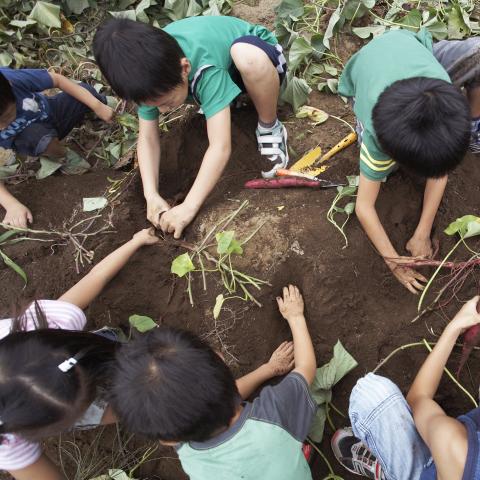On 国际植树节 (guójì zhíshù jié), or International Arbor Day, China puts a special emphasis on the importance of caring for the environment. Volunteers from all over the country spend the day planting trees, and many people enjoy doing outdoor activities.
In this article, you’ll learn all about China’s National Tree Planting Day, from its origins to modern-day observations.
Are you ready? Let’s get started!
1. What is Arbor Day?
Arbor Day is formally established as a national tree-planting campaign. As people become more aware of how important it is to protect the environment, they also realize the significance of National Tree Planting Day.
Since the 1980s, the Chinese people have voluntarily planted more than 35 billion trees. China is currently conducting six strategic forestry projects, including:
- Windbreak construction in the “Three Norths” (northwest China, north China, and northeast China) and the middle and lower reaches of the Yangtze River
- Restoration of farmland to forests
- Construction of wildlife reserves
- Protection of natural forests
The forest coverage rate in China rose from 8.6% in the early periods of the PRC to 16.5% at the end of 2000. For more recent estimates, check out this page on China’s forest coverage on Statista.com.
-
→ If you want to learn some environment-related words, here’s a Chinese vocabulary list for Earth Day!
2. When is National Tree Planting Day?
The date of Arbor Day in modern China has changed three times over the years.
Because of the tradition of planting willows on Tomb Sweeping Day, during the early periods of the Republic of China, Tomb Sweeping Day served as Arbor Day. In order to commemorate Sun Yat-sen, who passed away on March 12, 1925, the Nationalist Government changed Arbor Day to March 12. After the People’s Republic of China was established, March 12 was recognized as Arbor Day at the suggestion of Deng Xiaoping.
Today, Arbor Day still takes place on this date in 三月 (sān yuè), or “March.”
3. Chinese Tree Planting Day Observations
On Tree Planting Day, China hosts a range of widely organized tree-planting activities. Usually, universities, middle schools, elementary schools, and state-owned enterprises organize students or employees to plant trees in the suburbs. By planting seedlings, fertilizing, and watering, people learn to appreciate reforestation and further become aware of the environment in the process.
In China, Tree Planting Day has become such an important holiday that, in recent years, the “Internet Trees Planting” system has become popular. This system was initiated by the United Nations Environment Programme, China Population Welfare Foundation, and China Green Foundation. By simply logging onto the official website and clicking, people can donate one tree.
远足爬山 (yuǎnzú páshān), or “hiking and climbing,” is another popular way to observe International Arbor Day in China. Getting outside in the fresh air is a great way to internalize the importance of caring for the 环境 (huánjìng), or “environment.”
-
→ Do you feel spring in the air? Here are some words for the beginning of spring that you can study!
→ To learn even more plant-related vocabulary, check out our Chinese Plant Vocab Builder.
4. Sun Yat-sen
Do you know which politician in modern China first advocated reforestation and promoted the establishment of Arbor Day in China?
In China’s modern history, Sun Yat-sen was the first to realize the importance of forests and to advocate planting trees. The Nationalist Government set the day of his death to be Arbor Day.
5. Must-Know Vocabulary for Tree Planting Day in China
Ready to review some of the vocabulary words from this article? Here’s a list of the most important words and phrases for Arbor Day in China!
- 志愿者 (zhìyuànzhě) — “volunteer”
- 森林 (sēnlín) — “forest”
- 树 (shù) — “tree”
- 种植 (zhòng zhí) — “plant”
- 三月 (sān yuè) — “March”
- 环境 (huánjìng) — “environment”
- 国际植树节 (guójì zhíshù jié) — “International Arbor Day”
- 绿化 (lǜ huà) — “afforest”
- 远足爬山 (yuǎnzú páshān) — “hiking and climbing”
- 树苗 (shù miáo) — “sapling”
To hear the pronunciation of each word, and to read them alongside relevant images, be sure to check out our Chinese Arbor Day vocabulary list!
Final Thoughts
We hope you enjoyed learning about Arbor Day in China with us. Do you celebrate Arbor Day in your country? Have you ever planted trees with your community? We look forward to hearing from you!
If you would like to learn more about Chinese culture and holidays, you may find the following pages on ChineseClass101.com useful:
- Everything You Need to Know About Chinese Business Etiquette and More
- Use Your Body Gestures to Communicate in Chinese
- Chinese Words with No English Equivalent
- International Women’s Day in China: Happy Women’s Day!
- Qingming Festival: The Tomb Sweeping Holiday in China
Whatever your reasons for developing an interest in Chinese culture or the language, know that ChineseClass101.com is the best way to expand your knowledge and improve your skills. With tons of fun lessons for learners at every level, there’s something for everyone!
Create your free lifetime account today, and start learning with us.













